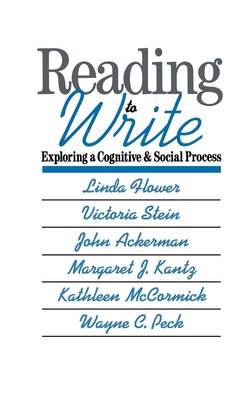
Vous voulez être sûr que vos cadeaux seront sous le sapin de Noël à temps? Nos magasins vous accueillent à bras ouverts. La plupart de nos magasins sont ouverts également les dimanches, vous pouvez vérifier les heures d'ouvertures sur notre site.
- Retrait gratuit dans votre magasin Club
- 7.000.000 titres dans notre catalogue
- Payer en toute sécurité
- Toujours un magasin près de chez vous
Vous voulez être sûr que vos cadeaux seront sous le sapin de Noël à temps? Nos magasins vous accueillent à bras ouverts. La plupart de nos magasins sont ouverts également les dimanches, vous pouvez vérifier les heures d'ouvertures sur notre site.
- Retrait gratuit dans votre magasin Club
- 7.000.0000 titres dans notre catalogue
- Payer en toute sécurité
- Toujours un magasin près de chez vous
381,95 €
+ 763 points
Description
The Social and Cognitive Studies in Writing and Literacy Series, is devoted to books that bridge research, theory, and practice, exploring social and cognitive processes in writing and expanding our knowledge of literacy as an active constructive process--as students move from high school to college.
This descriptive study of reading-to-write examines a critical point in every college student's academic performance: when he or she is faced with the task of reading a source, integrating personal ideas, and creating an individual text with a self-defined purpose. Offering an unusually comprehensive view of this process, the authors chart a group of freshmen as they study and write in their dormitories, recording their "think-aloud" strategies for reading, writing, and revising, their interpretation of the task, and their broader social, cultural, and contextual understanding of college writing. Flower, Stein, and colleagues convincingly conclude that the legacy of schooling in general makes the transition to college difficult and, more important, that the assumptions students hold and the strategies they use in undertaking this task play a significant role in their academic performance. Embracing a broad range of perspectives from rhetoric, composition, literacy research, literary and cultural theory, and cognitive psychology, this rigorous analysis treats reading-to-write as both a cognitive and social process. It will interest researchers and theoreticians in rhetoric and writing, teachers working with students in transition from high school to college, and educators involved in the links between cognition and the social process.
This descriptive study of reading-to-write examines a critical point in every college student's academic performance: when he or she is faced with the task of reading a source, integrating personal ideas, and creating an individual text with a self-defined purpose. Offering an unusually comprehensive view of this process, the authors chart a group of freshmen as they study and write in their dormitories, recording their "think-aloud" strategies for reading, writing, and revising, their interpretation of the task, and their broader social, cultural, and contextual understanding of college writing. Flower, Stein, and colleagues convincingly conclude that the legacy of schooling in general makes the transition to college difficult and, more important, that the assumptions students hold and the strategies they use in undertaking this task play a significant role in their academic performance. Embracing a broad range of perspectives from rhetoric, composition, literacy research, literary and cultural theory, and cognitive psychology, this rigorous analysis treats reading-to-write as both a cognitive and social process. It will interest researchers and theoreticians in rhetoric and writing, teachers working with students in transition from high school to college, and educators involved in the links between cognition and the social process.
Spécifications
Parties prenantes
- Auteur(s) :
- Editeur:
Contenu
- Nombre de pages :
- 280
- Langue:
- Anglais
- Collection :
Caractéristiques
- EAN:
- 9780195061901
- Date de parution :
- 20-09-90
- Format:
- Livre relié
- Format numérique:
- Genaaid
- Dimensions :
- 163 mm x 243 mm
- Poids :
- 621 g







